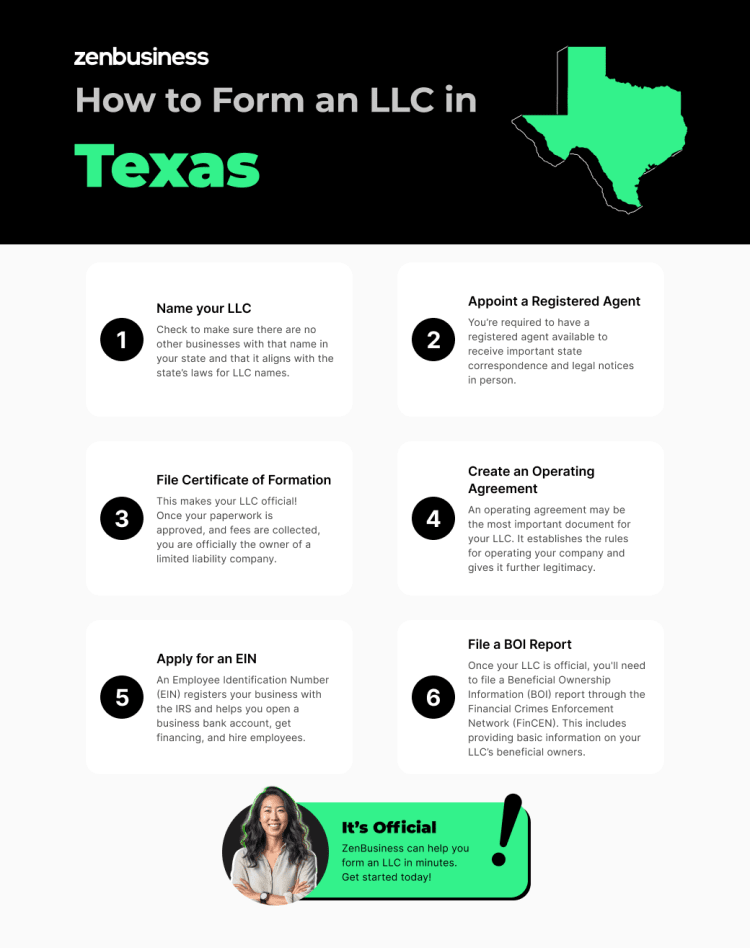*Mr. Cuban may receive financial compensation for his support.
Last Updated: July 2, 2024
Want to launch your business as an LLC? Texas is a business-friendly state, just as the limited liability company (LLC) is a business-friendly concept. It allows entrepreneurs to have liability protection without the cumbersome structure of a corporation. It’s sort of like getting the best plate of barbecue in town without having to wait in a long line.
Still, forming a Texas LLC requires you to follow certain steps and meet certain requirements, which can be scary if you’ve never started your own business before. That’s why we’re here to walk you through the entire process.
How to Start an LLC in Texas
The Texas Secretary of State has a few rules to follow if you want to form your limited liability company smoothly, quickly, and without costly fines. To show you how to start a Texas LLC, we’ve put together six basic steps (think of it as the Texas Two-Step plus four):
- Choose a unique name for your LLC in Texas
- Appoint a registered agent to receive important notices for your business
- File Form 205, a Certificate of Formation with the Texas Secretary of State
- Create an operating agreement to establish the rules for your LLC
- Register your business with the IRS and review your tax requirements
- File Your Texas BOI report
If that sounds like a lot, don’t worry. We’ll walk you through how to start an LLC in Texas in this article. What’s more, for those who aren’t fond of government bureaucracy (and who is?) we’ll show you how our services can help you start, run, and grow your business, including filing the paperwork to establish your Texas LLC.

Step 1: Name your Texas LLC

Choosing a unique and compliant name is the first step in forming your LLC in Texas. It must be different from any other existing business name in the state. It must also follow Texas limited liability company naming guidelines.
Here’s a simplified guide to help you with the naming process of your Texas LLC:
- Unique Name: Ensure your desired LLC name is unique and not already taken by another business in Texas.
- Compliance with Naming Rules: Adhere to Texas naming guidelines which include avoiding government or restricted words unless authorized. Your name should also be distinguishable from existing business names in the state.
- Check Name Availability: Utilize the Texas Business Entity Search Page to check the availability of your desired name. For a more precise check, contact the Texas Secretary of State at (512) 463-5555 or via email at corpinfo@sos.texas.gov.
- Designator: Include a designator like “LLC” or “L.L.C.” at the end of your business name as required by Texas law.
- Trademark Check: Conduct a trademark search at both the state and federal level to ensure your chosen name doesn’t infringe on existing trademarks. State trademark information can be found on the Texas Secretary of State website, and federal trademark information can be searched on the U.S. Patent and Trademark Office website.
- Domain Name Availability: Check if your desired name is available as a web domain for your online presence. Secure a domain name that closely matches your business name to ensure consistency and easy discovery online.
- Assumed Name (DBA): If you plan to operate under a different name from your official LLC name, register an assumed name (DBA) with the Texas Secretary of State.
- Name Reservation: If you wish to reserve your name before officially forming your LLC, you can do so for 120 days by filing a name reservation application with the Texas Secretary of State.
For a more detailed understanding of the naming rules and to review the state’s naming guidelines, visit the Texas Secretary of State website. If you need additional help with naming, follow the instructions on our Texas Business Entity Search page to do a search for your desired LLC name.
Ready to Start Your Texas LLC?
Enter your desired business name to get started
Step 2: Appoint a registered agent in Texas

Next, designate a registered agent for your business. The government has to be able to reach your LLC. They need a contact (an individual or business entity) and a Texas street address for your business so they can send official government correspondence, tax forms, and legal documents, such as a summons if the business is sued.
This contact person or business entity is called the “registered agent” in Texas. The official registered agent address for your business is called the “registered office.” The registered office doesn’t have to be where your business is actually located, but it does have to be a physical street address in Texas. You can’t use a P.O. box because notices like subpoenas must be delivered in person.
So, who do you choose to be your registered agent? You have three options here. You can be your own registered agent, appoint another person as your agent, or use a registered agent service. A few states will allow an LLC to be its own registered agent, but not Texas.
It’s important to remember that you must always have a registered agent. If the agent moves, quits, etc., you need to get a new one immediately and update your paperwork with the Secretary of State or risk having the state shut down your Texas limited liability company.
Step 3: File Texas Certificate of Formation Form 205

Filing your Certificate of Formation (form 205) with the Texas Secretary of State is the pivotal step to officially register your LLC in Texas. This document is known as the “Articles of Organization” in many other states.
To file / apply online, visit the Texas Secretary of State website and create an SOSDirect Account. The filing fee is a one-time payment of $300, with an additional 2.7% charge for credit card payments. The processing time for online filing varies but is typically 10 to 12 business days.
For those preferring to file by postal mail, the same fee of $300 applies. Complete the Certificate of Formation form and mail it along with the payment to:
Secretary of State
P.O. Box 13697
Austin, TX 78711-3697
Filing by postal mail is considerably slower, with an estimated processing time of 70 to 72 business days. Although slower, this method is an alternative for those who aren’t comfortable filing online.
What Information to Provide About Your LLC
- Entity Name and Type: Your chosen company name, followed by “limited liability company,” “limited company,” or an abbreviation like “LLC” or “LC.”
- Registered Agent and Office: Information of your registered agent and their physical address in Texas.
- Governing Authority: Indicate whether your LLC will be member-managed or manager-managed.
- Purpose: A general statement like “any and all lawful purposes” suffices.
- Initial Mailing Address: Provide an address where the Comptroller can send tax information and correspondence.
- Supplemental Provisions/Information: Optional section for any additional provisions.
- Duration: Specify if your LLC has a termination date or if it exists perpetually.
- Organizer: The person completing the form/filing the papers for the LLC.
- Effectiveness of Filing: Specify when your LLC will go into effect.
- Execution: Date and signature.
Once filed and approved, you’ll receive a stamped Certificate of Formation from the state, officially recognizing your LLC. If any information in the Certificate of Formation changes in the future, it’s required to inform the state about these updates.
Governing Authority Explained
The “governing authority” refers to the management structure of your LLC, indicating whether it’s managed by the members/owners (member-managed) or by a designated manager (manager-managed). Member-managed is commonly chosen when there are only a few owners who actively run the business.
Step 4: Create an operating agreement

Creating an operating agreement, although not mandated by Texas law, is a crucial step, especially if your LLC has multiple owners. This document outlines the operational rules, roles, and financial arrangements within your LLC, promoting clarity and preventing future disputes. It’s a testament to the flexibility that the LLC structure offers, allowing you to tailor the agreement to suit your business’s unique needs.
Here are the key components you may consider including in your Texas LLC operating agreement:
- Ownership: Specify the ownership percentages if it’s not divided equally among the members.
- Management: Detail whether your LLC will be member-managed or manager-managed, and the decision-making processes.
- Initial Contributions: List the capital contributions made by each member at the formation of the LLC.
- Profit Distribution: Define how profits and losses will be distributed among the members.
- Taxes: Indicate the tax classification for your LLC (sole proprietorship, partnership, C corporation, or S corporation).
- Ownership Changes: Outline the procedures for a member leaving, selling their share, or in the event of death or incapacitation.
- Dissolving the Business: Establish the process for dissolving the LLC if necessary.
If you’re unsure about creating an operating agreement, numerous online resources and legal professionals can provide guidance or templates to get you started. The operating agreement can be amended as needed with the consent of the LLC members, ensuring it evolves with your business needs over time.
Step 5: Apply for an EIN

Acquiring an Employer Identification Number (EIN) from the IRS is like getting a Social Security number for your LLC, and it’s free. You can easily apply online on the IRS website for a quick response. If you prefer mail, send your application to: Internal Revenue Service, Attn: EIN Operation, Cincinnati, OH 45999, though it’ll take about four weeks.
Most LLCs need an EIN for the following reasons:
- If your LLC has more than one member.
- Hiring employees.
- Opening a bank account, obtaining loans, or credit lines for your LLC.
- Opting for corporate tax classification.
Even single-member LLCs without employees may require an EIN for certain business licenses and permits.
Quick Note: Despite its name, an EIN isn’t just for employers. And don’t mix up the EIN with the 11-digit Taxpayer Number from the Texas Comptroller, which we’ll discuss next.
Texas Taxpayer Number
Once your Texas LLC is in the books, you’ll receive the Franchise Tax Responsibility Letter (Form 05-280) from the Texas Comptroller of Public Accounts in about two to three weeks. This letter furnishes an 11-digit Taxpayer Number for your LLC’s state taxes and briefs you on the Texas Franchise Tax, levied for the privilege of doing business in the state.
Step 6: File the beneficial ownership information report

2024 introduced a new filing requirement for LLCs (and other small businesses) across the country: filing the beneficial ownership information report, or BOI. The BOI is a federal filing that was introduced by the Corporate Transparency Act. The act exists to help enhance financial transparency and prevent companies from using shell corporations to hide illicit activities because each company must disclose information about their beneficial owners. A beneficial owner is anyone who exerts substantial control over the business, receives substantial economic benefits from the business, or holds 25% or more of the company’s ownership interest.
As a new LLC, you’ll need to file a BOI report with the Financial Crimes Enforcement Network, or FinCEN. Texas doesn’t require a separate version of this report, so you’ll only file it at the federal level. You can file online or by PDF. Either way, in the report you’ll need to include information about your beneficial owners, including their full names, addresses, and some identifying documents. There is no filing fee.
For LLCs formed during 2024, the due date for this form is within 90 days of Texas approving your Certificate of Formation. If you formed before January 1, 2024, you have to file the report before January 1, 2025. After January 1, 2025, new LLCs will need to file their BOI report within 30 days of their formation approval. For more information, please check out FinCEN’s website.
Need help filing your BOI report? Our beneficial ownership information report filing service can help.
Next Steps after Forming a Limited Liability Company
Once you’ve rounded up the process of forming your LLC in the Lone Star State, there are several essential steps you should consider to help ensure your business rides smoothly. Let’s explore these important aspects.
Open a business bank account
Once you’ve formed your LLC and secured an EIN, you’ll be able to open a business bank account. Having separate accounts for your business and your personal banking is critical for sorting out your finances at tax time. It helps you avoid commingling funds.
Commingling funds not only makes your taxes more difficult, but it could also be used against you if someone takes you to court to challenge whether you and your LLC are truly separate entities.
File Texas annual reports
After the celebration of establishing your LLC, it’s crucial to keep an eye on those calendar dates. In Texas, LLCs are required to file an annual report called a “Public Information Report” in association with the Texas annual franchise tax. This isn’t just a one-time task but a yearly responsibility.
Why’s this so essential for your LLC? The annual report keeps the state updated about key aspects of your business, such as management structure and operational insights. Not only is it legally mandated, but it also ensures you maintain a good standing with the state authorities. Missed deadlines can lead to penalties or, worse, the dissolution of your LLC.
Get necessary licenses and permits
The vast terrain of Texas is diverse, and so are its business requirements. Depending on your business’s nature and its specific location in Texas, you might need additional permits or licenses. For instance, if you’re opening a restaurant in Austin, you’ll need health permits, signage permits, and possibly liquor licenses.
Do your homework by checking with local city and county regulations. While your LLC status provides a legal shield, operating without necessary permits can poke holes in that protection.
Invest in business insurance
Insuring your LLC with appropriate business insurance is a prudent step to mitigate risks. Here are some common types of insurance you might consider:
- General Liability Insurance: Covers accidents or damages occurring on business premises.
- Professional Liability Insurance: Essential for service-providing businesses to cover against errors or negligence claims.
- Commercial Property Insurance: Protects your physical location from damages due to unforeseen events like fires, storms, or theft.
Each insurance type serves a different purpose, and the right mix for your LLC depends on the nature of your business. For more detailed information on business insurance options, consult with an insurance advisor or visit Texas Department of Insurance website.
Consider filing S corp status
Opting for an S corp status could provide tax advantages by allowing you to split your income into salary and company profits, potentially lowering your self-employment taxes. However, S corps are closely scrutinized by the IRS and have specific qualification criteria. It’s recommended to consult with a tax professional to understand the implications and benefits of S corp status for your Texas LLC. For a more in-depth exploration of S corp status, benefits, and qualification criteria, visit the IRS website or consult with a tax advisor.
Stay up to date
With Texas’s vast opportunities come changes in regulations, business trends, and networking possibilities. Engage with local business groups, chambers of commerce, or even online forums that cater to Texas entrepreneurs. This not only keeps you updated with the latest in business laws but also provides an excellent opportunity to network and grow.
Your LLC journey in Texas is more than just formation. It’s about growth, stability, and ensuring that your business dream doesn’t just survive but thrives.
Benefits of a LLC in Texas
Choosing an LLC structure in Texas isn’t just about following a trend; it’s a strategic move. The state’s business-friendly environment, coupled with the inherent advantages of an LLC, offers numerous perks. Here’s a closer look at why one might opt for one in Texas:
1. Limited Liability Protection
At the heart of an LLC is the protection it offers. When you form an LLC, your personal assets (like your home, car, or personal bank accounts) are usually shielded from business debts and lawsuits. In the event that your Texas LLC faces financial hardships or legal disputes, your personal belongings are usually safe.
2. Flexible Tax Options
Here’s a Texas-sized benefit — flexibility in how your LLC is taxed. You can choose between being taxed as a sole proprietorship, partnership, or corporation. But there’s a cherry on top: Texas doesn’t slap a state income tax on LLCs. So, while you’re enjoying your BBQ, you can also relish the fact that you’re keeping more of your hard-earned money.
3. Simplified Administration
Anyone who’s looked at setting up a corporation knows that the paperwork can be thicker than a Texas T-bone steak. With an LLC, you’re in for a leaner experience. The administrative process is more straightforward, which is a godsend for budding entrepreneurs eager to get their business off the ground without drowning in red tape.
4. Credibility
Sure, “John’s Barbecue” has a nice ring to it. But “John’s Barbecue, LLC” just sounds more official, doesn’t it? Those three letters, “LLC,” can add a layer of professionalism to your business. It signals to customers, suppliers, and partners that you’re serious about your business.
5. Management Flexibility
Texas allows you to structure your LLC’s management the way you want. Whether you prefer member-managed or manager-managed, the choice is yours. This adaptability helps ensure that you can operate your business in a manner that best fits your vision and goals.
6. Asset Protection Strategies
One of the unique features of Texas law is the strong protection of assets. For instance, Texas offers robust homestead protections, meaning your primary residence is typically safeguarded from creditors.
7. Growth Opportunities
With its booming economy, diverse industries, and thriving cities like Austin, Dallas, and Houston, Texas presents vast opportunities for business growth. Being an LLC in such a dynamic state means you’re well-positioned to capitalize on these opportunities.
In Texas, as the saying goes, “Everything’s bigger.” And that includes the benefits of setting up an LLC. Whether you’re a local or someone looking from the outside in, Texas provides a fertile ground for your business dreams to take root and grow.
Different LLC Types in Texas
Everything’s bigger in Texas, including the business opportunities. Across the sprawling plains, from the urban hustle of Houston to the serene landscapes of the Hill Country, Texas provides diverse options for entrepreneurs. Let’s explore the types of LLCs the Lone Star State offers:
Single-Member LLC
Picture a lone ranger, galloping across the vast Texan landscapes with a vision and determination to carve out a niche in the business world. For those individual trailblazers looking to harness the benefits of an LLC without sharing the reins, a single-member LLC is the perfect fit. It grants you the freedom of solo entrepreneurship with the shield of limited liability, helping your personal assets stay secure amidst the business rodeo.
Multi-Member LLC
Just as a group of cowboys makes a round-up smoother, a multi-member LLC is designed for teams. Whether it’s a dynamic duo or a larger posse of partners, this structure allows members to pool their resources, skills, and visions. Every member gets a seat around the campfire, sharing the profits, losses, and decision-making, helping ensure collaborative growth in the Texan business frontier.
Series LLC
The Series LLC is a forward-thinking structure that the state offers. Imagine a ranch with multiple herds, each distinct yet part of the same property. Similarly, a Series LLC lets you operate several distinct LLCs under one overarching master LLC. Each “child” LLC can manage its finances, members, and operations while being protected from the liabilities of the other LLCs in the series. It’s an excellent setup for entrepreneurs with diverse interests and ventures.
Professional LLC
A professional limited liability company (PLLC) is a business entity tailored for licensed professionals, such as doctors and lawyers. Its primary purpose is to provide liability protection, similar to a regular LLC, while also meeting professional licensing requirements. Note that a PLLC doesn’t shield its members from personal malpractice claims. It can, however, protect the members from malpractice claims against the other members.
Alternative Business Structures in Texas
An LLC isn’t the only business structure available in Texas. Here are some others:
Sole proprietorship: This is the simplest business structure. It’s composed of only one person and requires no registration with the state, unless you want a DBA. You’ll need a DBA if you want to operate your business under any name other than your surname. The problem with sole proprietorships is that they offer no liability protection for your personal assets. If someone sues the business, they can go after your personal savings, home, car, etc.
General partnership: A general partnership operates like a sole proprietorship, but it has multiple owners. Like a sole proprietorship, it offers no personal liability protection.
Corporation: Like an LLC, this structure exists apart from its owners. It offers the strongest liability protection. However, corporations are subject to “double taxation,” in which profits are taxed twice, once at the corporate level and again when they’re distributed to the individual shareholders as dividends. Corporations also have more formalities and red tape than other business structures, such as keeping corporate records and having shareholder meetings.
Limited partnership (LP): An LP is a type of partnership where there is at least one general partner who operates the business but has unlimited liability for any business debts; the limited partners only have liability up to the amount they’re invested in the business.
Limited liability partnership (LLP): An LLP is similar to an LP, except that all of the partners have limited liability; there are no general partners with unlimited liability. In an LLP, partners also have liability protection from the errors of other partners. Unlike LLCs, LLPs require that management duties be equally divided among the partners. LLPs are often used by professionals like lawyers and doctors.
Need help with filing your LLC in Texas?
Once you’ve finished the steps above, you’re (literally) in business! You’ve taken the first steps to building your dream company. But there’s a lot more to know than just how to start a Texas LLC.
You need to know about things like hiring employees, getting business licenses and permits, getting additional business financing if you need it, how to make changes in your business, and how to stay in compliance with the government.
Our many business services can not only help you form your LLC, but our business experts can also give you long-term business support to help start, run, and grow your business. In other words, it’s not our first rodeo.
So, if starting an LLC in Texas feels like putting socks on a rooster, we can help. Let us take care of formation, compliance, and more. That way, you can get back to running your dream business, whether it’s a tourism agency in Corpus Christi or a food truck in Austin.
Related Topics
TX LLC FORMATION THAT'S FAST AND SIMPLE
Take it from real customers
FAQs for Texas LLCs
-
The licenses and permits your business requires will depend on factors like your industry and location. Some states require a statewide general business license just to conduct any business in the state, but not Texas. Still, your local governments could require a general business license to operate in its jurisdiction.
Most businesses will need a Texas sales and use tax permit if they sell tangible personal property, lease or rent tangible personal property, or sell taxable services in Texas. You can apply for a sales tax permit through the Texas Online Sales Tax Registration Application System on the Texas Comptroller website.
Different industries require different business licenses. You can visit the Texas Economic Development website and the Texas Department of Licensing and Regulation to understand what your business will require at the state level, but remember that licensing and permitting also happen at the federal and local levels and vary across industries, so you’ll need to do some research to find out what your business needs.
If all that research sounds daunting, we recommend using our business license report, which will provide you with a comprehensive report of all the licenses and permits required for your LLC in Texas.
-
Texas’s $300 LLC filing fee may cause you some sticker shock, as it’s substantially higher than most states. But as you’ll see on our Texas limited liability company filing costs page, most of the other fees aren’t as drastic.
As you’re forming your LLC, you’ll want to know what you’ll be charged at each stage, allowing you to plan. To get the most current fees, you’ll need to check the Texas Secretary of State website. However, we’ve compiled a list of the kinds of administrative charges you may encounter below:
- If you decide to reserve a name for your new business, you’ll have to pay a fee of $40 to submit the name reservation application online or by mail. While you aren’t required to take this step, it might be worth the cost to ensure that no other business snags your preferred name before you can.
- If you want to use an assumed name when operating your business, you’ll need to pay a fee to file your assumed name certificate online or by mail. Again, this cost is not mandatory for all LLCs, but it is required for businesses that decide to adopt an assumed name.
- When filing your Certificate of Formation with the Secretary of State, you’ll need to pay a substantial filing fee ($300), whether you file online or by mail. If you pay by credit card, a convenience fee will also be charged. There’s no way around this sizable fee: All LLCs are required to pay it.
- If you choose expedited processing for business filing paperwork, you’ll need to pay an extra fee for each document submitted.
- If you choose to get a registered agent service, the prices range from about $100 to $300 annually.
- If your LLC’s annualized total revenue for the tax year is $1,230,000 or more, you’ll need to pay the Texas Franchise Tax. To determine how this is calculated, see the Texas Comptroller website.
Of course, this list doesn’t include other potential fees that Texas might require from your business, such as the cost of specific licenses and permits.
Additionally, these prices don’t account for the time and effort you’ll spend preparing and submitting the paperwork required. There can be many competing demands on your attention during the critical stages of starting your business. If you’re stressing out about filing official paperwork, you’re not focused on planning for the business’s future — a pretty high price to pay.
-
LLCs in Texas will need to pay taxes at the state and federal level (and sometimes local). With each, there are multiple elements to consider, so we’ll address them separately below. For local taxes, you’ll need to consult your local taxing authorities.
Federal Taxes
By default, if your LLC consists of one person, it’s taxed as a “Disregarded Entity,” meaning it’s taxed as a sole proprietorship. This means that profits aren’t taxed at the business level, but only when they “pass through” to become your income.
If your LLC has more than one member, it’s taxed as a partnership by default, which also means the income is taxed at the individuals’ level and not the business’s. This avoids the “double taxation” that corporations pay, in which profits are taxed at the corporate level and again when they’re paid out to the owners (“shareholders”).
Single-member LLCs don’t have to file a separate federal return for their LLC; they report the LLC income on their personal income tax return (Form 1040). But LLCs with multiple members must file a separate federal return for the LLC, Form 1065. Then each LLC member reports their share of the profits on Schedule K-1 and attaches it to their own personal federal tax return.
Members of LLCs can also elect to be taxed as corporations. Some LLC members choose to classify their businesses as an S corporation or a C corporation, which can be advantageous in some cases. In particular, many LLCs elect to be taxed as S corporations because it can seriously lower their self-employment taxes. You can learn more on our What Is an S Corp? page and our LLC vs. S corporation and LLC vs. C corporation pages.
There are also a few other forms of federal taxation to keep in mind. For example, you will likely need to pay certain kinds of employment taxes, such as Social Security, Medicare, and unemployment.
Even for business entities like LLCs, taxes can get very complicated very fast. Don’t be afraid to seek out a tax professional for guidance. They could potentially find tax savings you weren’t aware of as well as keeping you out of trouble with the IRS.
Texas Sales and Use Tax
Finally some happy news: Texas has no personal state income tax. There is state sales tax, though, and (as we mentioned earlier) you’ll need a permit to collect it.
The sales and use tax for Texas is 6.25%, but local taxing jurisdictions (cities, counties, etc.) can add up to an additional 2%. Speaking of which, those localities may require tax filings of their own. You’ll have to familiarize yourself with any such requirements in your area. Bear in mind that those taxes often revolve around what products/services you’re selling.
There are many, many additional taxes the state charges for a wide range of goods and services. Take some time to peruse the list of these on the Texas Comptroller’s website to see if any of them will apply to your business.
Texas Franchise Tax
The Texas Franchise Tax is a tax you pay for the “privilege of doing business” in the state. That may sound pretty pretentious for Texas, but the good news is that about 90% of LLCs won’t have to pay it.
Only LLCs above the “No Tax Due Threshold” pay the franchise tax, meaning that if your LLC’s annualized total revenue for the tax year is less than $1,230,000 (as of 2022), you don’t need to pay it.
However, the state does want you to tell them that you don’t owe anything for this tax by filing a No Tax Due Report (Form 05-163) and a Public Information Report (Form 05-102) every year (due May 15).
Do you think your LLC will be making enough to pay the franchise tax? If so, you’ll still file the Public Information Report, but instead of the No Tax Due Report you’ll file either the EZ Computation Report or the Long Form, both of which can be found on the Texas Comptroller website.
Texas annual franchise tax reports are due by May 15 each year.
Determining which form you need to use and how to calculate your tax payment gets complex very quickly, so this is another one of those times you’ll want to consult an accountant. You can also seek info on the comptroller website or call them at 800-252-1381.
Employment Taxes
If you hire employees, you’ll need to register for Unemployment Insurance Tax on the Texas Workforce Commission website. You must do this within 10 days of becoming liable for unemployment insurance tax. This happens after you’ve paid, in a calendar quarter, $1,500 or more in gross wages or you’ve had at least one employee working for the LLC during 20 different weeks in a calendar year, regardless of the amount of wages. It doesn’t matter if the employee is full- or part-time or even if it’s the same employee for those 20 weeks.
Other Taxes
We wish we could say that your business’s tax liabilities are limited to what we list in this article, but we can’t. In fact, the Texas Comptroller’s office says on its website that they collect more than 60 separate taxes, fees, and assessments, including local sales taxes collected on behalf of more than 1,400 cities, counties, and other local governments around the state.
That’s a lot, which is why we keep referring you to a licensed tax professional. They can help you figure out what you owe and when to keep you out of trouble. The Texas Comptroller’s office also has a customer service line you can call at 888-334-4112.
-
According to the Texas Secretary of State, the standard processing time for business formation documents when you file online is 10 to 12 business days from the day they receive your submission. The agency also cautions that timelines can fluctuate based on demand and staffing capacities, meaning you could wait even longer for your Certificate of Formation to be approved.
-
No, you don’t need to file your operating agreement with any state office. Just keep it in a safe place with your LLC’s other important legal documents.
-
You can change the legal name of your LLC in Texas at any time (so long as another business is not using the new name). To do so, you’ll need to file a Certificate of Amendment with the Secretary of State, which you can do through the Texas SOSDirect website or by mail. The Certificate of Amendment has a filing fee.
If you want to call your business something new but don’t care much about your LLC’s legal name, filing an Assumed Name Certificate will be far more cost-effective. This form costs a smaller fee to submit and enables your company to interact with the public under a different name than its official one.
-
To dissolve an LLC in Texas, you’ll need to submit a Certificate of Termination to the Secretary of State. This form can be submitted through the SOSDirect website or by mail, with an associated fee.
However, you can’t submit a Certificate of Termination without first getting proof that your business’s tax obligations are fulfilled in the state of Texas. You’ll need to apply for and receive a Certificate of Account Status from the state comptroller’s office before you can officially terminate your business. When terminating your LLC with the Secretary of State, you’ll be asked to append this document to your forms.
For more information, visit our Texas business dissolution guide.
-
No. Before conducting any business in Texas, a foreign LLC must file Form 304, Application for Registration of a Foreign Limited Liability Company, with the Texas Secretary of State. You’re also required to pay a substantial filing fee and follow all the associated laws for a foreign LLC doing business in Texas.
Getting permission to conduct business in a state other than your state of origin is called a foreign qualification. Texas imposes penalties for those who fail to register.
-
To get an LLC in Texas, you’ll need to follow the steps we’ve outlined above. Most importantly, you’ll complete and submit your Certificate of Formation to the Texas Secretary of State. Once the state approves your Certificate, your LLC is official.
-
Yes, you can complete the necessary paperwork yourself and submit it to the Secretary of State office, which will either approve or deny your LLC formation. You aren’t required to use a lawyer or another third party.
Disclaimer: The content on this page is for information purposes only and does not constitute legal, tax, or accounting advice. If you have specific questions about any of these topics, seek the counsel of a licensed professional.
LLC Formation States Near Texas
Ready to Start Your Texas LLC?




